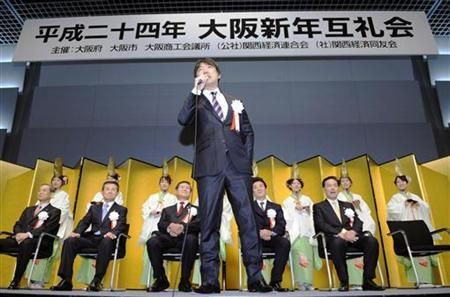Japanese Mayor Defends WWII Use Of Korean ‘Comfort Women;’ Tokyo Distances Itself From Comments

A prominent Japanese politician stirred controversy on Monday by saying South Korea’s so-called “comfort women” of World War II were “necessary,” risking further straining of ties between the two Asian nations.
The comments by Toru Hashimoto, the outspoken mayor of Osaka, who is also a co-leader of the emerging conservative Japan Restoration Party, rekindled historical animosities stemming from Japan’s 1910-45 occupation of Korea.
“To maintain discipline in the military, it must have been necessary at that time,” said Hashimoto, as reported by the Associated Press from Tokyo. “For soldiers who risked their lives in circumstances where bullets are flying around like rain and wind, if you want them to get some rest, a comfort women system was necessary. That's clear to anyone,” he said.
Hashimoto acknowledged that some women providing sexual services to Japan's soldiers did so “against their will” and called it "the tragedy of war.”
He said there was no evidence this had been officially sanctioned by the state and that the use of prostitutes by servicemen was not unique to Japan.
The Japanese government on Tuesday distanced itself from Hashimoto’s comments but refused to comment directly on them.
“The government's position on the comfort women issue is that, as I repeatedly said here, we feel pains towards people who experienced hardships that are beyond description and (this) administration shares the view held by past governments,” Japan's top government spokesman and Chief Cabinet Secretary Yoshihide Suga said on Tuesday, as reported by AFP.
South Korea voiced “deep disappointment” over the mayor’s comments noting there is “worldwide recognition” that the issue amounts to “a serious breach of human rights.”
“Our government again urges Japan's prominent officials to show regret for atrocities committed during Japan's imperial period and to correct their anachronistic way of thinking and comments,” a Seoul foreign ministry spokesman told AFP.
There are believed to have been about 200,000 “comfort women,” mostly Koreans, who were abused by the Japanese troops during World War II. Many have since died but the survivors have formed the Korean Council for the Women Drafted for Military Sexual Slavery by Japan to fight for compensation from the Japanese government.
Some former Japanese prime ministers have personally apologized but the organization says mere verbal apology is not enough and Japan should adopt a resolution and provide legal compensation to the women subjected to mistreatment.
Japan’s nationalist Prime Minister Shinzo Abe, in the past, had campaigned for revising the 1993 apology by Yohei Kono, Japan's Chief Cabinet Secretary at the time, that acknowledged the Japanese military's role in capturing and forcing tens of thousands of women into sexual slavery for Japanese soldiers.
In March 2007, Abe expressed doubts about Kono's statement, saying there was “no proof” of coercion on Korean women.
Although Abe said he honored Kono's statement, his remarks at the time prompted the United States House of Representatives to urge the Japanese government to "apologize, and accept historical responsibility" for the abuse of these women.
In April, Abe invoked South Korea’s fury by defending a controversial visit by several Japanese lawmakers, including Deputy Prime Minister Taro Aso, to the Yasukuni Shrine.
Abe, who made a ritual offering without visiting , said at the time that it was "natural to honor the spirits of the war dead who gave their lives for the country."
"It is also my job to protect our pride, which rests on history and tradition," he said, according to news reports at the time.
The shrine was originally built in 1869 to honor Japan’s martyrs and contains the names of soldiers who were killed in armed conflicts including World War II.
The shrine became controversial when it honored 14 men convicted of war crimes by a U.S.-led Allied Tribunal, including Gen. Hideki Tojo, the prime minister who authorized the attack on Pearl Harbor, an event that drew the U.S. into the war.
© Copyright IBTimes 2024. All rights reserved.





















